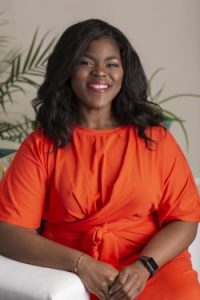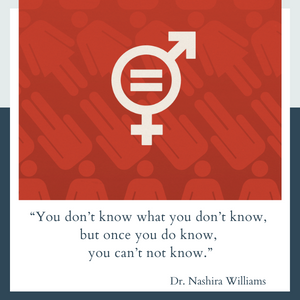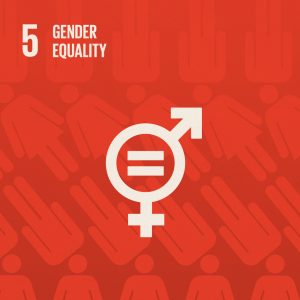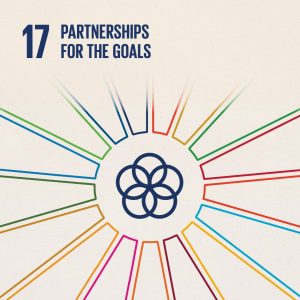By Grace Reilein.

Dr. Nashira Williams, Director of Women’s Initiatives and Gender Equity at Auburn
In the world of sustainability, there is the constant reminder that everything is interconnected. For example, when investigating SDG 5 Gender Equality, issues under that goal can be easily connected to poverty, health care and hunger issues, as women and children are disproportionately affected by all three of those. Dr. Nashira Williams is the Director of Women’s Initiatives and Gender Equity here at Auburn University. She has spent her career working in women’s centers and student affairs, ensuring success and equity for all students and staff in higher education. The position she currently holds is within the Women’s Initiatives and Gender Equity Department in the Office of Inclusion and Diversity. While she has only been in Auburn for less than a year, the impact of her work has been invaluable.
In her work, Dr. Williams enjoys finding innovative and creative solutions to issues on campus. In order to move the needle towards a more equitable future, this type of thinking is necessary among all members of the department. Dr. Williams sees the importance of collaborating and asking students, faculty, and staff for what changes they would like to see happen and work with those groups to come up with ways to achieve those changes. Apart from these collaborations, she also finds it very important to build relationships with students. Whether it is a conversation about deep, hard to navigate topics or just a light-hearted conversation, Dr. Williams is always excited to be invested in those discussions.
The goals of Dr. William’s office are to facilitate ways to move students, faculty, and staff forward. Through programs such as Women in Science and Engineering, Dr. Williams and her department have been introducing gender equity practices across campus. Since Dr. Williams’ arrival, the department has been looking at gender equity and working closely with on-campus groups like Spectrum to include additional definitions within gender. This new work focuses less on the gender binary. This approach to gender equity moves away from the protocols of the past to a more knowledgeable and inclusive future at Auburn University. Dr. Williams also works closely with interest groups on campus and assists in providing information and pathways to success. Recently, she worked with Period. Auburn, a group on campus with the goal of tackling period poverty, also known as menstrual equity. The plan of this group it to provide free menstrual products on campus for those in need. With the help of Dr. Williams and her office, Period has received funding and has plans to launch the initiative of supplying free menstrual products on campus in Spring 2022.
Though it is tempting to focus solely on the department’s successes, it is important to investigate what went on behind the scenes and to acknowledge the difficulties of gender equity work. According to Dr. Williams, much of what is done within the realm of gender equity is informed by either local or national policies, such as Title IX. It is difficult to navigate these policies, especially in times of office changes in all levels of the government. Those who are most affected by these policies are often the last to hear and understand them. Dr. Williams’ department works on ensuring that adequate and transparent policy information is available to those that are most affected, and but in some cases that information arrives too late from government entities. This makes the task more difficult for the department to accomplish. The realm of women’s initiatives and gender equity can also be a very emotional one, which makes their work difficult. Dr. Williams identified that it is often necessary to help individuals work through their emotions and to help them heal. This high level of emotion in some cases leads to high turnover, which makes the successes of the department all the more impressive.
 When asked what the most important lesson that she has taken away from her work, Dr. Williams responded by saying “You don’t know what you don’t know, but once you do know, you can’t not know.” She explained this sentiment by saying that her work involves a lot of grace. One cannot hold an individual accountable for something that the individual had no prior knowledge about. Often, Dr. Williams has had to teach others about certain issues and establish accountability once they have been educated and she summed up the sentiment by saying that “if you know different but do not do different, then you are part of the problem.” There is always room for growth and understanding, and Dr. Williams encourages both at Auburn University.
When asked what the most important lesson that she has taken away from her work, Dr. Williams responded by saying “You don’t know what you don’t know, but once you do know, you can’t not know.” She explained this sentiment by saying that her work involves a lot of grace. One cannot hold an individual accountable for something that the individual had no prior knowledge about. Often, Dr. Williams has had to teach others about certain issues and establish accountability once they have been educated and she summed up the sentiment by saying that “if you know different but do not do different, then you are part of the problem.” There is always room for growth and understanding, and Dr. Williams encourages both at Auburn University.
For more information about the Women’s Initiatives and Gender Equity department and other resources, please look at the links below!
- Office of Inclusion and Diversity Events
- Auburn Women’s Leadership Conference – Wonder Women: A New Age of Empowered Leadership
- Period. – the Auburn Alabama chapter of The Menstrual Movement
Post contributed by Grace Reilein, Program Coordinator, Office of Sustainability
Learn about the SDGs & AU and our contributions related to this post:






